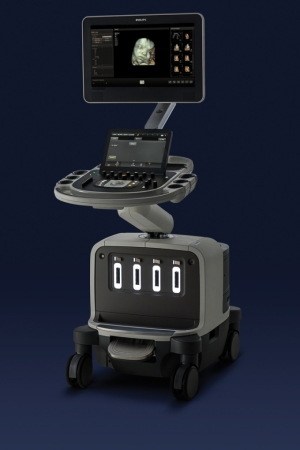by
Loren Bonner, DOTmed News Online Editor | September 11, 2013

Philips Healthcare's
new EPIQ ultrasound system.
Philips Healthcare's new ultrasound system, which received 510 (k) clearance from the U.S. Food and Drug Administration last week, was launched with what the company is calling first-of-its-kind technology.
Philips' EPIQ ultrasound system uses nSIGHT technology and Anatomical Intelligence to better identify life-threatening conditions, as well as image difficult patients.
"Hospitals are increasingly seeing patients who are difficult to image with high body mass index, so the ability to actually get image quality with less clutter and more tissue detail and clarity means less repeat exams," Dr. Ivan Salgo, senior director of cardiology for Philips ultrasound, told DOTmed News.



Ad Statistics
Times Displayed: 174588
Times Visited: 3185 For those who need to move fast and expand clinical capabilities -- and would love new equipment -- the uCT 550 Advance offers a new fully configured 80-slice CT in up to 2 weeks with routine maintenance and parts and Software Upgrades for Life™ included.
Philips new ultrasound is being marketed for cardiology, radiology and OBGYN. While all three segments need this type of new beam forming technology to get penetration in the difficult patients, EPIQ might have the most clinical benefits in the cardiology space.
In echocardiography, ultrasound is the imaging modality of choice for looking at heart failure and valvular disease.
"You can use other modalities like nuclear medicine techniques, but ultrasound is commonly used because it's portable, it has no radiation and it's good at looking at chamber size and volume," said Salgo.
Clinicians are increasingly interested in having an ultrasound technology that gives them the ability to do what's called speckle tracking. According to Salgo, EPIQ has a tool where, without clicking around, the user can zero in on the region of interest to get the global longitudinal strain, which is a sensitive marker for looking at morbidity and mortality.
"The idea is to make it fast and more reproducible. Doctors are being asked to do more and see more patients, and they don't want to compromise the quality of the results," said Salgo.

